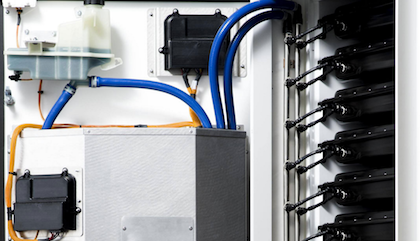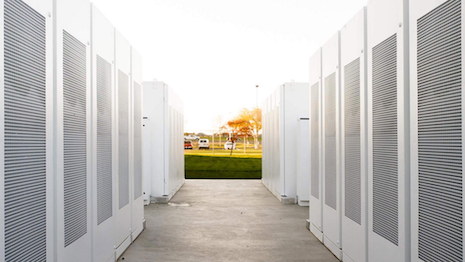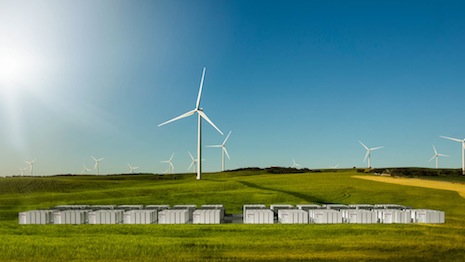U.S.-based Tesla, Inc. is proving its commitment to providing sustainable methods of power by turning private homes into a connected power plant.
After recently dropping the Motors from its name, Tesla is on a mission to prove it is more than just a car manufacturer but is also passionately focused on helping the earth. The brand is offering more support for Australia’s unpredictable electricity issues by providing solar panels and its innovative battery packs to private homes.
"What this project will do is connect thousands of solar and battery systems to make one giant, coordinated virtual power plant," said Tom Koutsantonis, energy minister at Government Business in the House of Assembly, Adelaide, South Australia. "Once again South Australia is at the global forefront of renewable energy and storage technology.
"Labor will always stand up for South Australians, and this project will lower power bills by 30 per cent for those that need it most, before being made available to a broader network of customers," he said.
Energy efficiency
Tesla will start with a trial period of 1,000 public South Australian housing properties to test out its project, which will eventually grow to 24,000 over the next four years.
If all goes well, about 50,000 homes in Australia will be fitted with equipment to help provide stability to the region’s volatile power grid. Australia has been looking for answers to its electricity problem since its major blackouts in 2016.
Participating homes will receive a 5kW solar panel system Tesla battery.

Tesla's powerpack that will be brought to homes in South Australia
Tesla first looked to solve the serious infrastructure problem in South Australia while simultaneously expanding its sustainability practices in July 2017.
In September 2016, Australia sustained major damage to its electricity infrastructure and a massive blackout from a 50-year storm, followed by a heat wave that continued the blackouts. Tesla provided a 100 MW/129 MWh Powerpack system that, coupled with Neoen’s Hornsdale Wind Farm, provides a sustainable source of energy for South Australia (see more).
This technology is now being fitted to private homes for even greater stability and to help Australian citizens receive significant breaks on their power bills. Frontier Economics estimates this could cut participants’ electric bills in half.
A grant of $2 million Australian dollars, or $1.6 million at current exchange, and a loan of $30 million Australian dollars, or $24 million at current exchange, from a taxpayer renewable technology fund will support the project.
Homeowners will get their solar panels installed for free, and will be financed through the profits derived from the energy created from their units.
Tesla claimed its connected housing power plant will create 250 megawatts of solar energy and 650 megawatt hours of battery storage.

Example of Tesla's powerpack. Image credit: Tesla.
The project was announced on Feb. 4 through a press release by the Australian government.
CEO commitment
Tesla is not only committed to sustainability, but innovation in general.
The company’s bullish attitude comes from its CEO and founder, Elon Musk, who is known for his eccentric but groundbreaking strategies and inventions.
Tesla is even instituting a 10-year performance award for Mr. Musk, making his earnings contingent on meeting market cap and operational goals.
During the next decade, Mr. Musk will earn no salary, bonuses or equity that vests with time, with his entire compensation centered on a 10-year grant of stock options. Along with banking his earnings on company success, Tesla’s announcement notes that Mr. Musk will remain at the helm of the company for the long term (see more).
"We know that people in social housing can often struggle meeting their everyday needs and this initiative will take some pressure off their household budget," said Zoe Bettison, social housing minister at Government Business in the House of Assembly, Adelaide, South Australia. "I am very pleased that this Government is able to back South Australia’s housing trust tenants through providing cheaper power through this exciting program."
{"ct":"lwPsqApn6+dKJ1dMHW02YJUL2VygqmrtQCOZL+V+zB2UTazsuEy\/lbRiV\/7z7qrLeW0cpdqShgycF73wh47gNYeY\/AmQTxYeQ47mOBRxAtC9oVP70iv\/mqgUL4JamxBCWqjqy7cCGazKwgNrCUMftMOSH2JQESNETmJsgG3UNiaXpU919zZ4\/\/bJ9W8cxPuFXzRuO5jqKUWJewRas8E+VA5beYLCx+C5eluUKQtSbLa80OG5lgURdWU01fDbGg+Z2WPzRV5K0DJrjhr5Je+Vq9+y3y1\/LtEjy8G+sN2rGwZb8xdRylrP77aUC\/l1F\/6pSBfl4epg1kSttuNJjtmOd37JvD2InGg8YVEM4iK84ZRqLk0qrcwbmjOePq4uQfndKFTydE3toeJugxx+hDGDhArNBk63LLjhpHaZhyEO7UK7ZhEn7y5MUbvx+1gNOtbfU2BL16GDgmzvGv2lOK9J6ZwJse5Gf5OslZBDoY1nUNpiJj7MTEdMI\/SsdaNhiGLAUOsyDBEeGTn+GOKI0zLrqH0l4vWc2bbh7knUcZxAjqdd3+4QGnWcU16dymeXyKk4t8YKitRgKMaT8ud+yJMR5iugmCYY8M7WWoLG7U3TMO9NRNXhG6552c1fJygAA3S3aSUKgliaNhIgnjddHIwL917BR\/9VJ2s8ooDG0Aj9YPbNb4IM+vbPzdG6mgI+zEO1tcNIniW4pxsmDrFXnE2NA\/BEfis\/7rWC1FwxhNDg0AWhUgs77RCHaHdAP\/sbV5pQ5dump\/YXGIY6rPH5PdKMCQxDOrVqZq8IhFzZ2J3ZBTh6h1QUzg2cGmZ2YCeaXOi88VAWxnpPJO5Gyw8vDY5aQQIRzmJURz2SMSDogACj5BF1iKKQPw\/oTqUD6w6tvz5Dd3Kuc1SYRZ966tNotT7nvVGISEUGOJU52mTmbB4Hh6E+fFU6iwrwUOsCRSrfuvEFoev35YCXUsQhUGes\/7uGs6zPvPPOfQLDNKIb5lwE+KTiCgFI7X4oAFmOrBTj74qoM3mnDzQL0emVm8TIug0EH1d1G3s985sCRb8UCR\/vLGdWa7V\/ttkKUgnl5G7KStJkJTxbh0N\/PiWVAqzIznx2\/LbBiTrrcllKJOBCfkAAIobobhmiCF3prhgjJsqsa\/DQPX8\/Aip65Rex0\/wtQwqhqvGtzULI5xXRZyJ+eaaP4ab8sD+2yS3OsfKSuCKkq+zroceUb9QjzW0P6cKenjm0LW98jiz+J711qzMPLFrpXebduG1BvIZQRYJjfDIl25\/aYYr+++EzRWoURkTIi7FfFTLdSXuYsn9PrVvZ5I\/olS+jukAvhkBKzjeuupXl0Z3p+hui2MahI57JhONFfF1yPJZIimdrEKjHZ6lHp8oWjskQVkWsWCPHghB0NAcCsrJSPfkAzFMZ5cUUyW2z8q+PpatsxW8l7dBXjOAjdaqiC\/s\/tM8xoPAmOfzw0WDCuCyCLiIOSGIVOuNAaMW+15zXApCjr8HNrHJ0ht3ECRXTLZ7n4GnwGpkvIILlHtN\/mTIvrc3QUjGkf0OrxQHMwpozIM8S\/uTs2sTLVjX66SewAUI8DMe2v\/q3xMro+mOwmQB4ZrwJhiLrKXSLT\/BM3\/69yFJleFwp1rK3\/ZfhhZXsZDh7kDJIt50XlwAcURMVRTyPjLXA\/jWXe365Z9TWFK7gp6obfGfi5AbClySJm0jux+XLpetUuWOTb8ZRezy+skDh0szMCxcTyqQ3In3jBdAFu7fRwe0oXPQQWNlfd\/+yVDQNdVneXuP0mjLcVyQQU6cWis+abx+3vTDsnTH\/jAZJ5H\/6yHpSfINea6UduT8+c3VTt+ha8gBltw3amga+JW\/74+UwlyyCDf+XaulbLQLQBF3UumWCjkd8ml1cjEw7D7rPYDEWPSUzTZ\/RGMgkNU9k6iQS5hMa8QuYzQctk\/dJIOYlCLfYoo1qx56mC\/y2Mn2OyuvOXtc6gnDQ6\/GsicV3zAjvC46Evyl7cCXsTMhh6MFstpzKcxNBI1Ku6RGrDh9BlKfzGJqiLlxbF2NnLNyS2Fw1OMqUV3cpbDTgBMQ6l6RLfJKmtNIcnGwmjeD8z9yCsG3LUqt6J8GUq82acOlO1rb\/xTyXdED1zJkq7Bb\/kqAfx2OrzJk1ztCDDWYVUucHirdaeP+nCAAzLkOXgMC6oW6wBuYBlDca0Y1fJ6TDvnSvXpW8IMjzsLoaTfGh1S09FcVejQnrrqFB701WYe2Q8Hd5VsByLOqNBwZn1OsE+nlgcEZEPrVcTJDTAYI+fMHxbz7COjtX\/74nz7L75Qgk+sajrtxjzETligMTv\/0Lc32l2MqWzjT7pKI+U0vPMUhCXWVkfIwMAxKvAmiHKerruObPhBsdMeZzpCLE+s0mzTiNAUPQAT+Ief4rQ+6xmy8fXvjW0dP6UjKb1UOLI\/NmD7fXq\/WbrzLrYmMXEKRERESVIe9DWuJwWu8qDzpuv0PTEvWvf3rylWAnqqprEvgaE3VHsJmF0RfavT8TwgeOBy43CrryXCG9kSjFXOT80YZOqWICqkvVqZd71eiaN++CgSLEBWhw5NLU8Q+ik+oshRqtuv2lZCQhePH2PslNJqbNcqASDDIIQhaFG7v0dw+491C3085tN\/RsYa89ockkrKb3mSSuib\/8J4aUVjvcMLv3nDVbs8sd4XmJDxbQU9TC8bbpvYJJVIPu9dORsi0umqovr1oEkstRRz9ZuaGFsSVMENBb9DtF4pb592m1c0A7UEgRppAMZHShU5fW8sOAqEyEqRnzgdZrAmJyBY5iX5uQ4TKEiP5\/a2RJscrlOmZGfCrjS0+CqC4EBjNSMNrrICeY2mt+FMmtCuI55F7JDdk8YPBHu0UL93sWiJe7zws6gG+FvwmpEg0RbctnBeR0IynyGp3NxL96AvHBvQBoAEVEQeMdh2jTMtla2Hn+FIjAm3FHCziPDaUmf\/0Y0shTPj2Hrw1gWDQr+O247k61gjUmdOrCR+dBh291yGVDvUSODud1cqeQiofBQ\/YWQKj01aEuHJOINxS2pIpGAsijvSfzYgAbISV5cI2yOo\/MXFfbOv\/PeYFsXgug1gryvOOth8C1W32y8bJ1M3s4N4VhcznqA+38nz3C4UNWE387qFT8z88lEIHBfhYi+vhOyNUTU2m5Lh94tUXzduAn7z+FWj0pAjGZ\/WvsOhelG3RtueEttuUB8eAHVvrDT18LV7hu\/arSUf45lu9eIki+ceCg156Ax7KxuF3CIpF0GpOBUzRT+fVX\/8NDCIrhyw5M7Pd73Rokx1YGzO0g5LpbRWk03mdttLiDcFZAgnCXoxKC0suCGKWDWXtaQLRH\/Ac+3tWWSgv1GxrT5+YKXxaRBdqjZjLhvLBR4aKeSOoT2f7zFzKUngKleXftpIE+lkuJ1+wuL8yfAv1Ns5vhtCuZGSajCjSm\/4F1VpEt9RORwnnP1YHZzqhVvaLhrJdMvcDXijMMnLStSYpxrZQEjywaF2YI32SvIBaU9DK9Uxh35xYOkEsQiVf3bDMV6tMnHVUh2f5k+zyButFI7yJllZl6KzgHye9dxEIFzTs1PyW2M6iriYtYQWd6jC7l7lqaRGNlhytnRbo3YZMcEQ\/4mrVHHWdQ+DylB\/o4OQ4uwdXHDbVNE4QKgb8UvMLLr0S69WfL279zODsMZYEXNhFm7l0fzMuOD1hYvRuFKn2oE\/sd8U+JZGSO53AvMYJuo8sixv5WCyFoZ\/660keM2Cmeb+r2HSDGWqdvT4cdNGufOE2Cf3lJeScvL+KDgE33PYs+wsfT4xo0MtfItw18h9GLVrr7eKBAnkPxKujXNRCC6Uqyz936dZrk5xN6BlKvwm8\/6dHm7EyWGKd31NLI1QwHmIEpuxJoOq1kRm4EJmFqrs1Y+sJKhqYzOEiAbb2dkFdFsHI+sEK9zpCUDO7F\/9+S4bCR+Q5d5V4Hvve+cCmB98VPotMttBEIs91Tj2+LG4q4gqM5\/VuYa9Qk1ZoAfCCZiCxvZJoWTqHmUgC8ucR4Ta71DzjwKzD69RssGcDu5b0RniWSDme8ToXatDSkmLjXdNINtUkBWbf0grX+srp1jhG40SCFdTM\/Ir5vdEGDbrsdAie6xMdhdMGDMun8pY5iEVJRKBkgcPUO2mwFVxeOfo8ke3rXlJG8YolwulA8depDB7o0\/z0Y1pvj+oEa9n\/kuDznae6XBdNVs1i1hp2xD6ZsxT5eIXdBnzGaz\/cDNfJ1aCEmZIoX1OoLeOo6tqss7PMzxg0hvJnefoi1xcpY728NMrnKc2S6KMQifxwOHxAU1fpyvrgi1RiQKaRlhhHOHOo6C9pXnwzxVwhcY\/Bgsw\/Dblz8ZhEueCg+Y3HP1y\/RZQ5Dd718dFTSQR45nwAy\/6Ma3oO29Mh0Jw0gXT8DikEXFSh7cTHxmAqphETUzJW7Trt6mQxSGSj89BXvURAxVpRZCyr9U0fNU4dpeDKpW39EZed2\/0UEO3BWGmM54NTfPLbLaJ+o10Cu3GGL4xzwF3Wla06gHpwuqSFIL0RHn3Thd0GTRLxpHfagu4TXHa3LVjUswaDmmHPvVMCCp+9AhmrX21dCQYe7vjh0uSs+H9hq6shn5da8l7ORQOw9FqlbxCwnyiDiZ0D5KzezgmSk1PhoqsuhHU4JDyIlPwABDQJdQojqvmPUUPnqQSlGmWv1h1CtKFmeGftgpX0p\/7LgUxYvbzODkk09ELWerWVJ1296SWfUndJs8VwRxNMfFOg5yTxLRf0zrZbcM0q2FqvzWTDXsHh3G8HyjCMpfd4lBkJE1bGs7Cc26UmVGL0D1SrXDkbiil2zJPSP+j3QfooswiuIVX3ogbQqQoYHSmIrzRDAVctK1DboXGpMfHyv\/9asF1\/zW9Rw8Z1\/SJlCHSLxAjIZrk54s\/SxAAPA2UnJh+xGvRlCKbshp2rXI6q8S7Xtjkqban7fx485Izdn0HQ1CkY+UiN4tcT091fxkYlTmMYMi\/D\/Pl1S26wKw6+CKzFkBjlDqKd9xuK60qS3w5v82pZATe\/3oGscBWYe1spckmpIM4KbJJzv7AeobLBZ8J7\/vlZGHHWb\/yBTRTjjUW6dHHirfx4auHpqVeRjLtl7PQvj7t9qQ3rFgGaDS150y2P2eU3ObJfkZMhEdPNjNHRQiS4pQu25w+2FJ+w56yh+IIoEBjrhb7jST8W5dqDR6qYA55J+hn5iY\/CChNk9tv24AIxAFzhfITDnD8nbeTA5kjm4HshPpeRESGdPC\/uU\/qSk\/d+L835BU5n3Q\/RvtPCQmqrpqriUmDcnwcKLYW0KzU3YJS6NfCYhReukl9SIZxIYRyxoFqks1SRtTEhSHKTxQgm\/9JoP+G3ddvzHkXc9fyvt+ac4EGyL1LDbbG5K+K6gd5njy\/Z4TfS4UK\/rWrxnYnrQ+2ndbp\/lV6f\/An\/e7ATrCrHBFkahOAyJHBASVtgS2W9X8oMC0dFohCJVN+mtKbovBOGgMYuSIzZiYEXNt7J0LHfjhyN1HSTHXhsDF55T1s8dQ+g0pU6B1rOp\/thvWlc2idT1XZ0ZWAG214nWlKtTxNpuaWroWvVqXNB29oIVPZ4MKW+n6G+2gsUxlNNW+soO2sZFtxtjweHRV67oMVUksBMhviFNie8pA00t0vVl7WlcpM4fYguvfLA7bSGPB\/bPPJjl\/sHTEnmN\/\/2WIeuzB4NSUcsaHgXkH4sQgp9S\/A9+FX\/BW73YmAb0nSQq4PjntMk3gvLcgoaH3ifl6yJvhCrbjChK2\/b+\/gV3RQwEykdbiImqNX5gAkDSFlq4dEUTmaXbzNKLk8to+698GYo2CsmO14gDfEbfgOgp7GnppzPXU2acrHJtVEopw4wCTF2zvZ2hpyFEwB8iNUJrRvNmxb168WIDEyxCOL6Hr4UVPRhBZVB0BFngYFLT53HS1ha1RKujpHGfKwKnJPZaDZM\/3Y4TnNtJ7EThK\/1k6Lm5xZjrQxUnAnhU4GzvRDHVeoVWBJthUb76aUt6a3ty05pSei2Zl1dA3ET9cMxBojC\/ozLZM+pFqTDo4MYAzKgxJ64RLQxpsn+SToQBtWn3ES17DCoPq\/eGX9RwFyYie5GGimyBkIhxU8sBO9J9RAzVsa\/vBZdp\/xevXkIm1H8rwf4NfwWIqc+yn+oz0MzE\/AsPn41I9Y6lcu3KeycSxVKwqLtg+PqNoDYuLd+Mu6\/p8r1CfKS69fAztM1s5r6PQfQZCj8\/tf4r9cVFQkT6qI\/GlZVzW2oufLlGu5fNG1cSLWPRMkc\/0wZUJ\/wC1mqJv40VJ9bsvumGJgYTvYgagf3TFVxjX7XEhzbMxstxYdAcRCZTR9T47+iCgQqguapWSwGzFnkGJ+AxzOyMAYs6sQ4XYXm9da97Ua\/l4+eQDuZbx\/V8bKVa4\/M3Qqp10tBO9lSMnYZ0bb2wXt2CmLu0jcTlAK2KYpHBgrcTOGD2JDaM4RI28rySuyB3EZDphTBkNXTi7sbIZTWnFePfThxXnUktjY4BI8YQ0Q2XEkkfoL11n5W2MsoJqAXyCTA9RbM0wVJhfjaPhRTDxWe4XIOHG8AvU0k0U4CKRSvAiShGGcpbujlKX4l7visxZH\/thwrYpu9Vvhn2qsunVIy5fo6I5bGvoi6dwTE2zSbvGfkgJV7yN3sc3E7m1FtFec1FjVv16Cbum4fK9z4wllXzCKJ2UWoDELQTnrrLVxXNjTmvnHBYcYsihLZd5FbAnvST9YKmoaQRcWBE\/aGfjEEpDZSZu1M6\/y\/JPl8cyys2VUsMuFttBMt24mPr1FaABBMsQ6RE7w18hLMntQNXW015Si9KtGPC4Vs4Zy+KNd8Xp8lW6i3uB1xk+HRXW4eaU+CNss4F4v5oWAkxZIppVjsUBgiCbGXOQPhUYwJNYrZQ\/9m2XkDF34Vxt4AhLDweoz7m1hO4010tYEjk0odmd2XCvi7g8oFpX2rwhYSlLPrvG9n5EnmjTpN1gTZIrL7m4ZurL456mvrkyc2Z+PDbB64zxfVf6Irwe5MkBw1qJ3+Ke05IQPZC4BppAnlQz+aLITHSmbn423G0KBzBqb290xSYqAFuuy0E9a7XnHAWeI4AfDSOpkBUFKR7EE1Wc9yKkiEf2z27nqjaOYyuPGEGIuz3cTtkca7JGq0l\/I8gKmOZqNXcGXWC9IDscAmgoaXWo3hCwfG0oELw9LLO4N\/8hdlClfEAgeHEO7ODvhO0LoLDw5d8UFM9NU3z8ULPv3Nlo8X6lvdru3vUAibRebJaM2VIxdvKJfJnI8nYVIDldtxBRheO8mixBSuyHCkc8l0+zhzRySFo3w6NLIHMnx5O4iIMEiRzkNuvKi7BMnRwD6sbeQVNgP4V6tbpg7mhGsnG4zhcET2ewXotrpDLPdh4Qo\/38u6O6R5IDWFzpwBZPTrP1c7EuNF7RmP31kUpPa3ks5wyzpZwnDdjEsKudr4VL9xFti+G1yUP9XcJyTXbTLXuCugcr+SdBcvEOgPkuam9qh7L+kPd57Lv93oyMMtEdSRi7Vx27QvCSoghtBbJCWzkWhbtM5gk6IsEzFxk81CX","iv":"ec63792dc63cc4b5d6d5b1320a0a7c6d","s":"7ec8d5690125bb54"}

 Tesla will help provide stable and sustainable energy for Southern Australia. Image credit: Tesla
Tesla will help provide stable and sustainable energy for Southern Australia. Image credit: Tesla